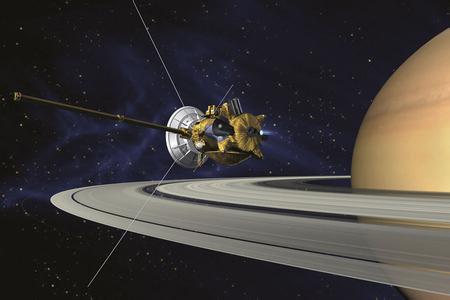What smells like rotten eggs, a used litter box, and an almond-munching mortician? The answer is one of those dirty snowballs in space, a comet. Comet Churyumov-Gerasimenko, to be exact, which is starting to thaw as it closes in on the Sun.
什么东西闻起来像臭鸡蛋?用过的垃圾箱?嚼着杏仁的殡葬业者?答案是太空中的“脏雪球”之一——彗星。确切的说,是丘留莫夫-格拉西缅科彗星,该彗星一靠近太阳就会开始融化。
Since August, the European Space Agency's Rosetta spacecraft has been monitoring the comet. Right now, Churyumov-Gerasimenko is between the orbits of Mars and Jupiter, some 300 million miles from Earth. It's so chilly out there that scientists expected Rosetta's instruments to detect scarcely more than odorless carbon dioxide from the comet.
自八月起,欧洲航天局的罗斯塔飞船便一直在监测该彗星。如今,丘留莫夫-格拉西缅科彗星已进入了火星和木星之间的轨道,离地球约3亿英里。那里非常寒冷,因此科学家预测罗斯塔能够从该彗星上探测出几乎无味的二氧化碳。

But instead Rosetta has also detected hydrogen sulphide—with its rotten egg odor—as well as ammonia, with a smell familiar to anyone who has changed a cat pan. Also in the mix: formaldehyde and methanol, found in embalming fluid, mixed with faint traces of poisonous hydrogen cyanide, which has an almond-like aroma.
但事实恰恰相反,罗斯塔探测出了带有臭鸡蛋气味的硫化氢,以及带有猫粪味的氨气——任何给猫喂过食的人对这种气味是再熟悉不过了。罗斯塔还在防腐剂中发现与微量含杏仁气味的有毒氰化氢混合在一起的甲醛和甲醇。
Rosetta will deploy a probe to land on the comet this November, and will soon gather more pungent whiffs of the comet's appalling perfume. But by studying this Eau de Comet, researchers hope to better understand the deep—and apparently smelly—chemical origins of our solar system.
罗斯塔将于今年11月份安排一架探测器到该彗星上,很快的,它将从该彗星那骇人的“香水”中带回更多刺鼻气体。通过研究该彗星的液体,科学家们希望能对太阳系中的这个具有明显臭味的、深奥的化学起源有更好的了解。












